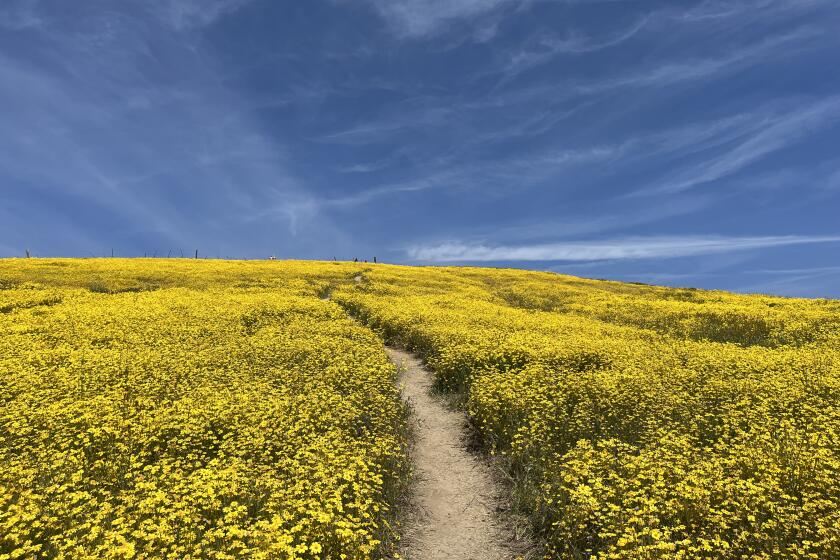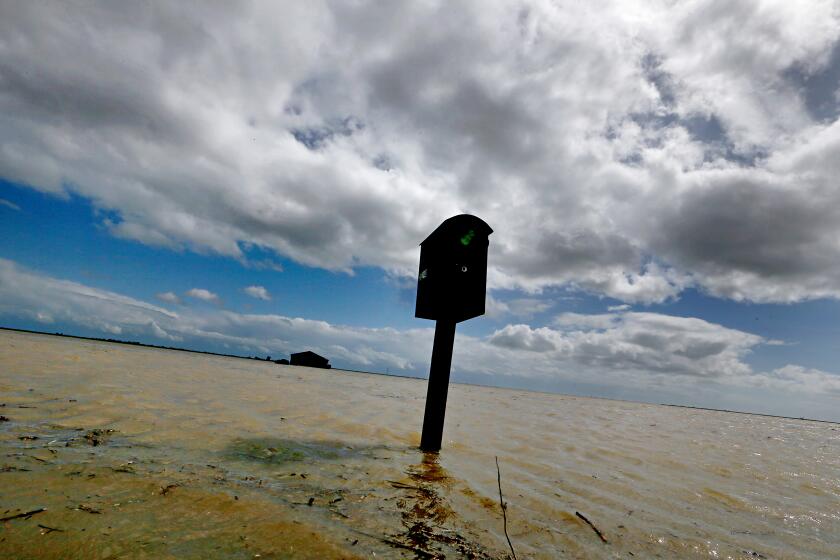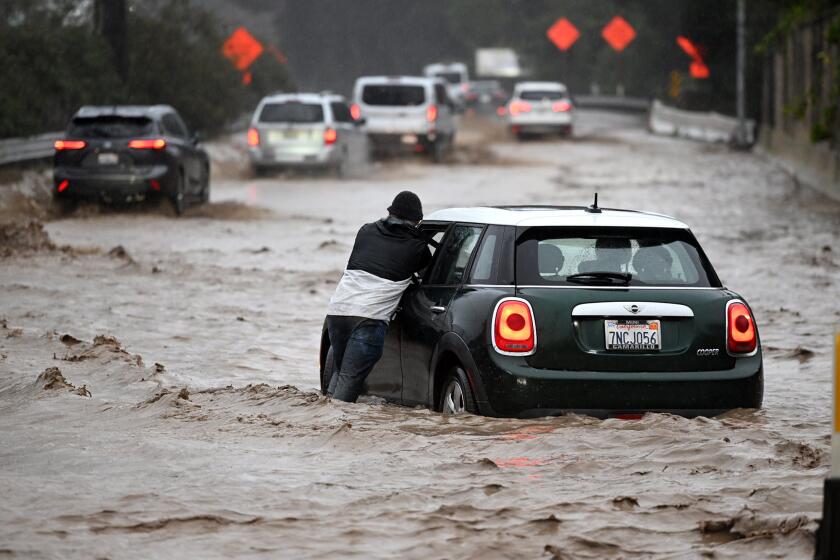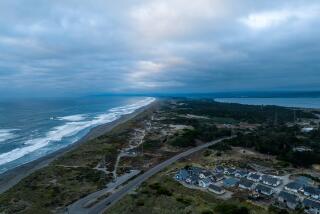Majority of Californians fear worsening weather swings due to climate change, poll finds
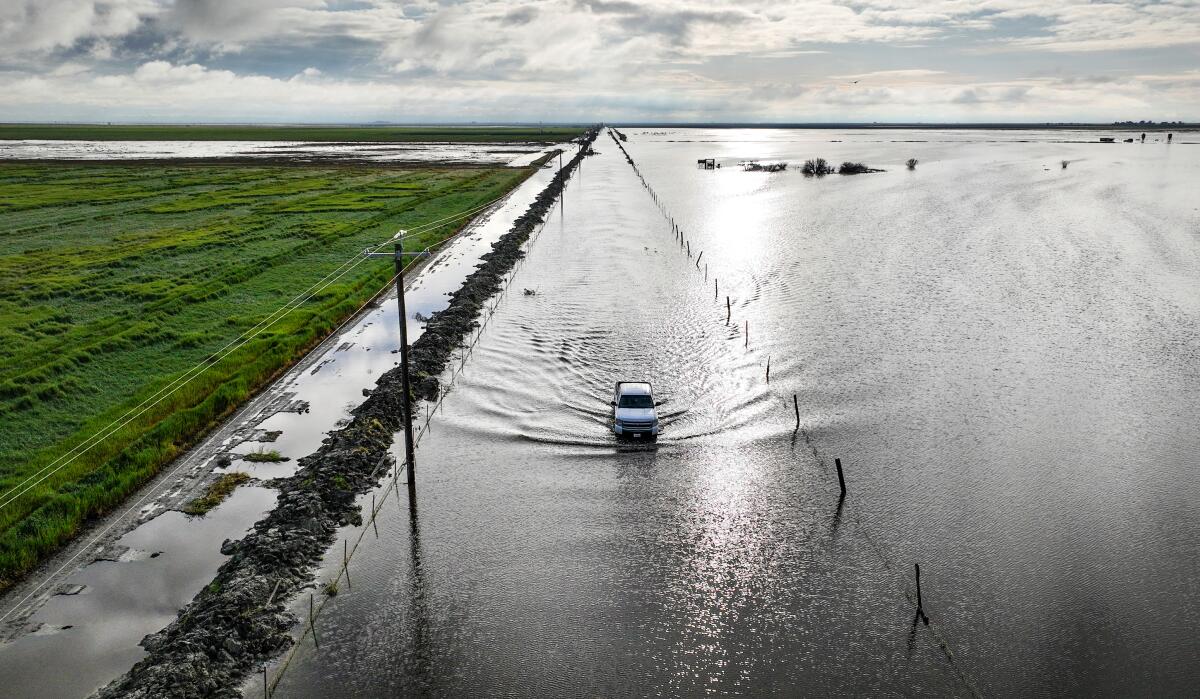
- Share via
As California continues to experience swings from one weather extreme to another, a majority of residents say they are increasingly concerned about the state’s changing climate, and some worry that weather impacts could force them to move in the future.
Nearly 70% of registered voters say they expect that volatile fluctuations between severe drought and periods of heavy rain and snow — what some call weather whiplash — will become more common in the future due to climate change, according to a new UC Berkeley Institute of Governmental Studies poll co-sponsored by the Los Angeles Times.
The poll comes on the heels of a shockingly wet winter that ended three years of drought, killed nearly two dozen people and flooded the long-dry Tulare Lake Basin.
Although responses were sharply divided along political lines, they seemed to reflect a growing unease among residents about the current and future effects of global warming on California.
Thirty-one percent of voters said they were somewhat or greatly affected by the heavy rain, snow and flooding that occurred this year, including 8% who said they experienced a “great deal” of impact.
Of those who reported a “great deal” of impact, two-thirds said they were somewhat or very concerned that in the next few years, they may need to move away from their homes due to extreme weather events in their area.
Let’s embrace the wildflower superblooms, abundant snowfall and roaring rivers while we’ve got them.
Residents of California’s North Coast/Sierra region reported the most impact from the winter storms, followed by the Central Coast, the Sacramento Valley and the San Francisco Bay Area.
This year’s wet winter was particularly acute in those regions: In the Monterey County town of Pajaro, levee breaches spurred evacuations and sent floodwater into people’s homes. In the San Francisco Bay Area, powerful storms felled trees, prompted widespread power outages and sent glass tumbling from skyscrapers onto city streets.
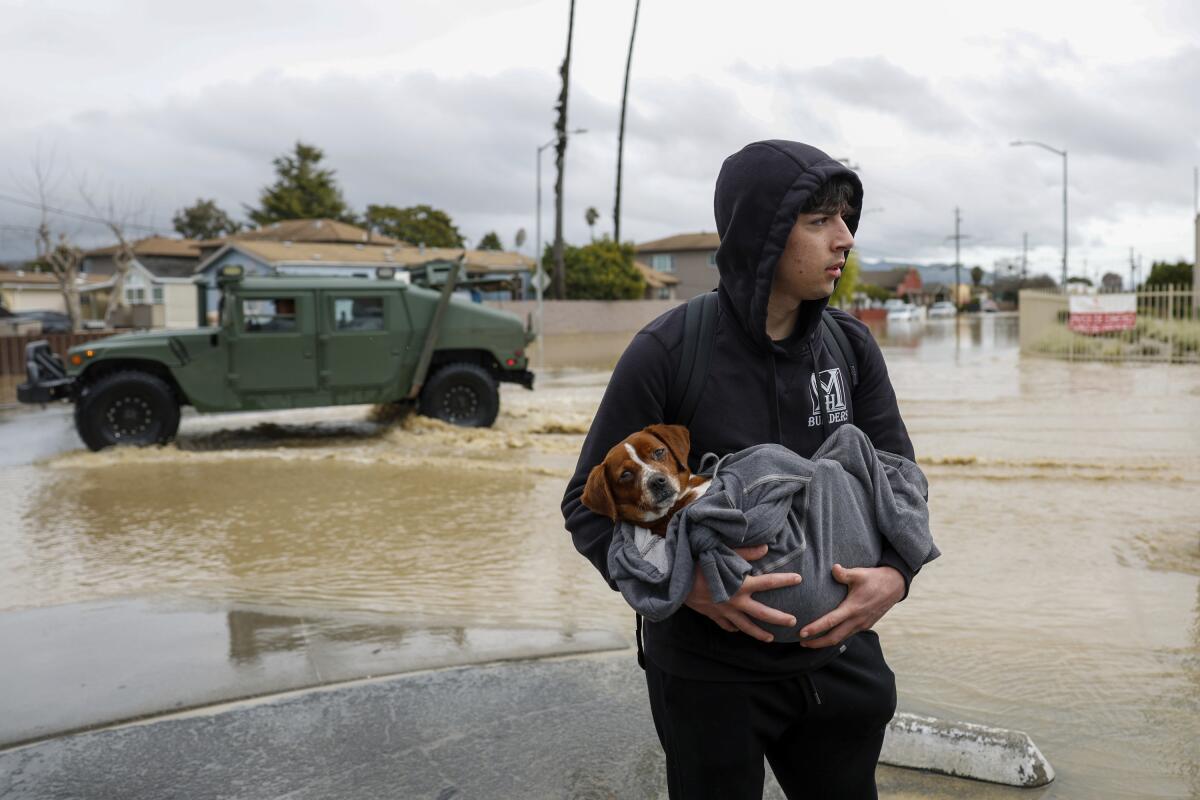
And in the Tulare Lake region, floodwater and melting snow rushed over low-lying fields and ranches, refilling the dormant basin for the first time in decades. Officials say the area could remain underwater for at least two years.
Aside from regional variations, “big partisan differences” permeated most of the responses to climate questions, said Mark DiCamillo, director of the IGS poll. Forty percent of Democrats said they were somewhat or greatly affected by the winter storms, compared with 16% of Republicans.
There was an even greater divide among those who are concerned that extreme weather will get worse — 91% of Democrats compared with only 28% of Republicans, the poll found.
“I think Republicans have a different mindset, and perhaps that leads to greater tolerance of some of the hardships that they may be seeing around them,” DiCamillo said. “That also probably leads to a much smaller proportion of Republicans saying, ‘I’m very concerned about these weather events in the future that may lead me to want to move from where I live.’”
The ‘phantom’ Tulare Lake returns
Ellen Hanak, vice president and director of the Water Policy Center at the Public Policy Institute of California, said concerns about worsening weather extremes are warranted.
“California’s precipitation patterns have always been volatile, with swings between wet and dry periods, but we are already beginning to see signs of increasing weather whiplash — with more intense dry and wet periods — and this is expected to increase in coming decades,” Hanak said.
The poll’s findings are broadly consistent with annual surveys conducted by PPIC that track Californians’ views about climate change impacts, she said.
The institute’s survey from July 2022 found that nearly 7 in 10 Californians think the effects of climate change have already begun, and 8 in 10 say climate change is a serious threat to California’s future economy and way of life.
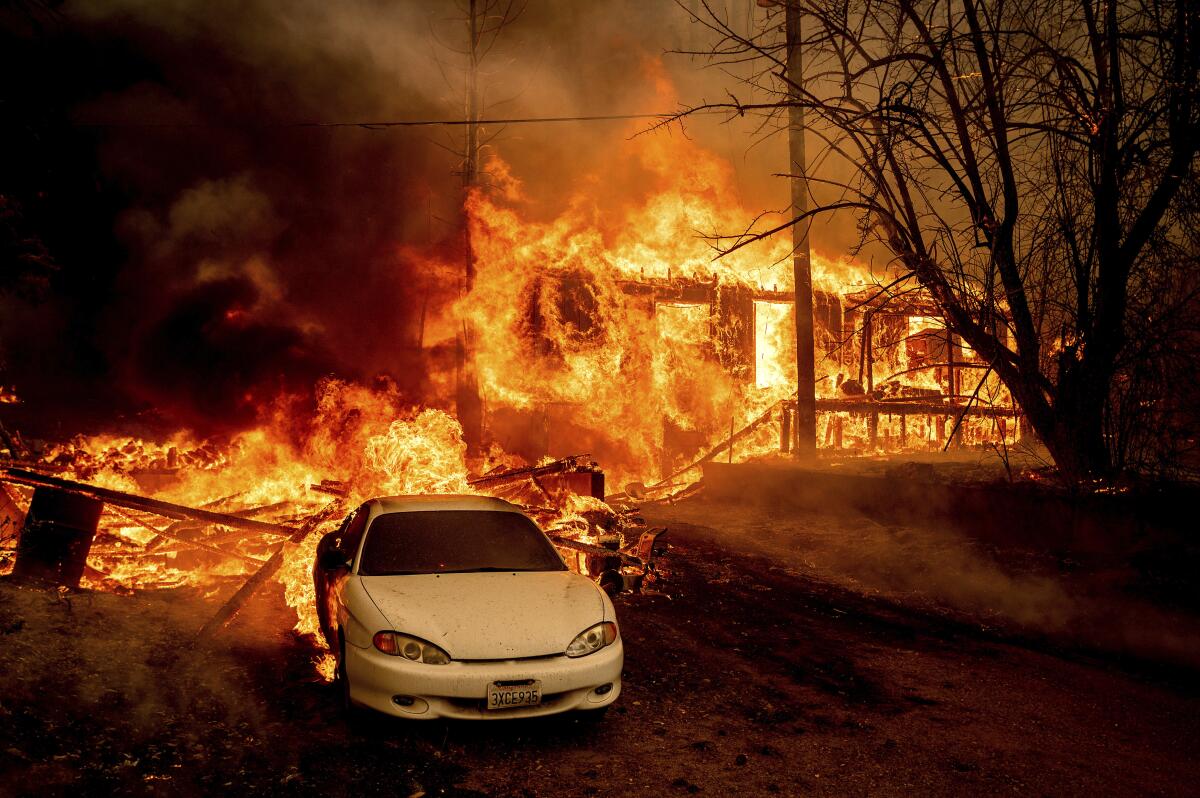
It’s likely that more Californians will have to move away from their homes due to changing climate conditions — notably, increasing wildfire risk, Hanak said.
“To my mind, increasing wildfire risk may cause some of the biggest shifts in this regard, especially as it becomes more difficult and expensive to purchase insurance,” Hanak said.
Just last week, State Farm halted home insurance sales in California, citing rising costs and wildfire risks.
Hanak noted that the risks are often greatest for lower-income communities and residents with fewer resources and less capacity to adapt.
The state’s major cities lost people between 2020 and 2022, especially in Northern California. But exurban boomtowns, including some Southern California areas, saw gains.
Despite some divisions, respondents to the IGS poll were somewhat more aligned across the spectrum when it came to one of California’s most ingrained environmental principles: water conservation.
Eighty-one percent of respondents — including 95% of Democrats and 61% of Republicans — said that despite this year’s unusually wet winter, it’s still important for the state to enforce its water conservation policies and programs for residential, commercial and agricultural water users in the coming years.
Among such efforts are two bills passed Wednesday by the state Assembly. AB 1572 would prohibit the use of drinking water for purely decorative grass along roads, in medians, at public and institutional properties, and at businesses and multifamily housing developments. AB 1573 would require nonresidential projects to eliminate the use of nonfunctional turf and transition to low-water and local native plants beginning in 2026.
“This is really grass where the only time you walk on it is to mow it,” said Tracy Quinn, president and chief executive of Heal the Bay, which supported AB 1572 along with the Natural Resources Defense Council.
“There is really broad agreement among stakeholders, including many water agencies, that there really is no place for nonfunctional turf in our communities,” Quinn said. “We just don’t have the water to be able to waste, to keep grass alive when it’s serving a purely aesthetic function.”
The ban on decorative grass would take effect in phases between 2027 and 2031. The proposal would make permanent measures that California water regulators have imposed on a temporary basis.
DiCamillo said the broad agreement on the matter speaks to Californians’ ethos of water conservation.
“I believe that Californians have been conditioned now to value water, and to conserve as much as they can because there may be years when we don’t have much,” he said. However, he noted that Democrats were more than twice as likely than Republicans to rank water conservation as “very important.”
A strong El Niño could augur yet another wet winter for California, as well as drive the global average temperature to a record high, experts say.
The poll was conducted from May 17 to May 22 — only days before California and six other states reached a tentative agreement on how to dramatically reduce the use of the Colorado River, a lifeline that supplies water to nearly 40 million people in the West.
About 60% of respondents said they favored reductions in water deliveries from the Colorado, while 14% said the status quo should continue. Twenty-seven percent said they were uncertain.
The poll also comes ahead of the expected return of El Niño later this year. The climate pattern in the tropical Pacific is associated with wetter winters in Southern California and hotter temperatures across the globe.
Forecasters say there is a 98% likelihood that at least one of the next five years — and the five-year period as a whole — will be the Earth’s warmest on record.
The poll was administered online in English and Spanish among 7,465 California registered voters.
The poll sample was weighted to match census and voter registration benchmarks. Because of weighting, precise estimates of the margin of error are difficult, but the results are estimated to have a margin of error of 2.5 percentage points in either direction for the full sample.
More to Read
Get the L.A. Times Politics newsletter
Deeply reported insights into legislation, politics and policy from Sacramento, Washington and beyond. In your inbox twice per week.
You may occasionally receive promotional content from the Los Angeles Times.
